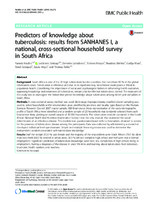Predictors of knowledge about tuberculosis: results from SANHANES I, a national, cross-sectional household survey in South Africa
Date
2016Author
Naidoo, Pamela
Simbayi, Leickness
Labadarios, Demetre
Ntsepe, Yoliswa
Bikitsha, Nwabisa
Khan, Gadija
Sewpaul, Ronel
Moyo, Sizulu
Rehle, Thomas
Metadata
Show full item recordAbstract
BACKGROUND: South Africa is one of the 22 high tuberculosis burden countries that contribute 80 % of the global
tuberculosis cases. Tuberculosis is infectious and due to its rapid and easy transmission route poses a threat to
population health. Considering the importance of social and psychological factors in influencing health outcomes,
appraising knowledge and awareness of tuberculosis, remain vital for effective tuberculosis control. The main aim of
this study was to investigate the factors that predict knowledge about tuberculosis among 18–64 year old adults in
South Africa.
METHODS: A cross-sectional survey method was used. Multi-stage disproportionate, stratified cluster sampling was
used to select households within enumeration areas stratified by province and locality type. Based on the Human
Sciences Research Council 2007 master sample, 500 Enumerator Areas representative of the socio-demographic
profile of South Africa were identified and a random sample of 20 households was randomly selected from each
Enumerator Area, yielding an overall sample of 10 000 households. The tuberculosis module contained in the South
African National Health And Nutrition Examination Survey I was the only module that examined the social
determinants of an infectious disease. This module was questionnaire-based with no biomarkers obtained to screen
for the presence of tuberculosis disease among the participants. Data was collected by administering a researcher
developed individual level questionnaire. Simple and multiple linear regression was used to determine the
independent variables associated with tuberculosis knowledge.
RESULTS: Half the sample (52.6 %) was female and the majority of the respondents were black African (76.5 %). More
than two thirds (68.0 %) resided in urban areas, 56.9 % did not complete high school and half were not in formal
employment. Significant predictors of tuberculosis knowledge were race, sex, completion of high school, being in
employment, having a diagnosis of the disease in ones’ life-time and learning about tuberculosis from television,
brochures, health workers, and teachers.
CONCLUSION: To reduce the burden of tuberculosis in South Africa, media campaigns targeting both rural and
urban communities should include conveying accurate information about the disease. Policy makers should also
address structural barriers that vulnerable communities face.

